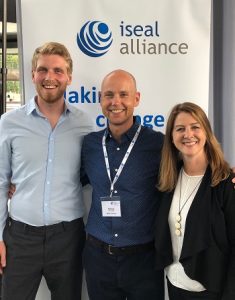The Golf Environment Organisation (GEO) Foundation, supported by multiple partners and stakeholders, has announced the development of a new and ground-breaking framework for golf’s social and environmental reporting.
The news was shared in front of an audience of global sustainability systems, government agencies, non-government organisations, corporations and other institutions.

Robert Ewing (left), Credibility Manager, GEO Foundation, with ISEAL Alliance’s Patrick Mallet (centre) and Kelli Jerome, Executive Director, GEO Foundation.
The announcement represents a significant watershed in how the sport can quantifiably and consistently track and demonstrate its progress and value.
The Independent Chair of the project’s Strategic Advisory Group is Paul Druckman, former CEO of the International Integrated Reporting Council. Druckman said: “Golf is a large and influential sport, comprising over 34,000 grass-roots facilities in over 200 countries, hundreds of professional tournaments and with a significant supply chain. It also has powerful media and reach, and can inspire hundreds of thousands of fans.
“Golf is not unique amongst business to increasingly recognise the need to consistently measure and communicate with credibility its environmental and social impact. Through this work, golf is also gearing up to show how the sport delivers against global priorities, principally the United Nations Sustainable Development Goals.”
Jonathan Smith, Executive Director of GEO Foundation, the international not-for-profit company dedicated to helping advance sustainability in and through golf, added: “The goal is to enable golf to accurately monitor, measure and communicate real impacts, and to connect that locally, nationally and internationally. It has been a complex but enjoyable challenge – studying, collaborating, developing a deep understanding of the priority metrics, mapping audiences and building user-centric software to simplify data gathering at scale.
“The project began a year ago after discussion hosted by the Vidauban Foundation and the response from golf associations, as well as externally, has been tremendous. We’d particularly like to thank strategic partners: The R&A, Vidauban Foundation, Toro Foundation, and the ISEAL Innovations Fund, plus over 150 scientists, association leaders and grass-roots golf course and club managers who contributed to the various consultations.”
The framework is designed to help golf more consistently quantify and communicate its ‘net impact’ across golf’s ‘Sustainability Agenda’. As such it covers the material environmental and social issues across three main themes: fostering nature, conserving resources and supporting communities.
To ensure credibility and connectivity, the framework aligns closely with mainstream sustainability goals and reporting systems and is underpinned by the core principles of inclusiveness, materiality, reliability and context. It will be available in the coming months.
With both golf’s voluntary standards and the new metrics fully integrated into OnCourse, the software solution used to engage golf facilities, tournaments and associations, the next phase is to work closely with partners to roll-out, engage and drive active participation. OnCourse is currently used in 76 countries and is available in nine languages.
“We look forward to working with many partners across golf to roll-out the framework and the software, empowering them, their golf facilities and their tournaments to drive individual performance and, at the same time, pool real data and stories from thousands of sources. This will support the strengthening advocacy and policies of a growing number of international and national associations,” Smith added.
Patrick Mallet, Director of Innovations, ISEAL Alliance, said: “Anyone who’s serious about sustainability knows that the ability to measure performance and impacts is key. What we like about GEO’s approach is that here we have an example of a sector that is seeking to become more transparent, and shortening the distance between commitments, actions and communicable outcomes.
“Building a framework and associated software for issues as complex as these, and for small and medium-sized enterprises like sports clubs is no mean feat and we congratulate everyone involved for their commitment and their creativity.”
Steve Isaac, Director of Sustainability, The R&A, added: “The R&A has long advocated the value of golf building a robust database of key performance indicators to measure and report on golf’s sustainability performance locally, nationally and internationally. Our support of the GEO Foundation and this project, in particular, should help golf understand its current performance, identify priority areas for improvement, enhance the sport’s image and help the sport become more resilient to the many environmentally and socially driven challenges we face related to the changing climate, regulation or resource constraints.
“We are extremely pleased to see this initial milestone achieved and look forward to further collaboration with GEO and our affiliates around the world to engage grass-roots clubs in the gathering, analysis and communication of data back across the sport of golf and to external audiences.”
Judson McNeil, President, Toro Foundation, Toro Giving and Community Relations at The Toro Company, said: “Every sector’s use of critical natural resources such as water is under scrutiny. We have to be able to account for every drop and show how we are maximising efficiency. That can only happen with data, which is expertly analysed. That is why the Toro Company has supported GEO Foundation in their endeavours over many years and why we will continue to lend our support and expertise in the future.”
Julie Duffus, Olympic Movement Sustainability Manager, International Olympic Committee, said: “This framework is excellent news for golf, the Olympic Movement and global sustainability. As the leader of the Olympic Movement, the IOC looks forward to engaging further on this exciting initiative and supporting its implementation. We hope that GEO’s leadership will inspire others to adopt such a systematic and holistic approach to sustainability.”















